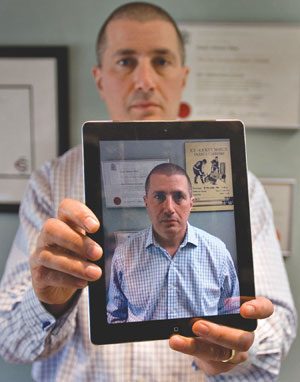The mere mention of a lawyer using anything but a BlackBerry smartphone would have raised a few eyebrows several years ago. Some may have even laughed at the idea.

But that’s not the case anymore.
Times have changed and more lawyers are trading their trusted BlackBerrys produced by Research in Motion Ltd. for an Apple iPhone, iPad tablet or other mobile operating device.
For Toronto criminal lawyer David Rose, the issue comes down to what makes his job easier. “I find the iPad is far more powerful as a platform to access documents and the Internet,” says Rose of Neuberger Rose LLP. “The BlackBerry is an inferior platform for searching the web, word processing, and looking at documents.”
Rose still owns a BlackBerry Torch phone. But he only uses it for phone calls. That wasn’t always the case. Rose had always been a BlackBerry guy.
“I got [RIM’s] PlayBook a year ago within its first week of coming out. I was so thrilled to have a tablet,” says Rose, who notes things then began to sour. “I soldiered through with the PlayBook. I had two of them before I finally gave up on them.”
He then switched to an iPad. “I haven’t looked back. It’s an unbelievably powerful device. Frankly, I haven’t had any problems with the iPad and I used to have tons of problems with the PlayBook. I really, really wanted to believe in the PlayBook.”
RIM came out with the PlayBook a year after Apple released the successful iPad tablet, a device that has since turned Rose into an Apple guy.
Rose is far from alone in making the switch. According to The American Lawyer’s 2011 technology survey, 96 per cent of responding Am Law 200 firms said they have attorneys using iPhones.
But not everyone is ready to give up on the BlackBerry yet. The reasons often include its security features.
“I’m staying with BlackBerry and there are several reasons why,” says Andrew Feldstein of Feldstein Family Law Group in Markham, Ont. Feldstein refers, for example, to the BlackBerry enterprise server that gives customers significant control over their device.
“Your IT people can have access to all the contacts, all the e-mails on your BlackBerry. All the type of central, important things to someone if they lost their BlackBerry can easily be recreated. Even their BlackBerry Messenger contact list can be recreated,” says Feldstein.
“In other words, you can wipe out the old one, have a new one, and have all of your important information restored, which I understand the Apple can’t do as well.”
Those features are also vital from a central management perspective, says Feldstein, who has been a BlackBerry user since the days of the side dial.
“When my IT person looks at our BlackBerry exchange server and someone is complaining they are having a problem, their e-mails aren’t going through or their BBMs aren’t going through, he can see the last time that BlackBerry was communicating with the office exchange server and know exactly when it stopped working, which can be very important in terms of getting it to work again in a much faster way.”
But that’s not the only security measure that keeps Feldstein with BlackBerry.
“Everything with BlackBerry is encrypted when you’re sending it from a BlackBerry and that’s not the case with Apple, which makes it significantly easier to intercept,” he says.
Toronto lawyer Esther Daniel is considering a move from the BlackBerry to an iPhone but finds herself having a hard time deciding. While she has found her BlackBerry to be unreliable at times, she says she’s staying with the company’s device for now.
“It’s a Canadian company,” she says.
“It has a superior security system compared to Apple, which is probably a major reason, I suspect, that they attract a bulk of their customers. I also like a keyboard that I can feel with my fingers.”
And if that is not enough reason, her phone carrier “has me hostage with my contract."

 But that’s not the case anymore.
But that’s not the case anymore.